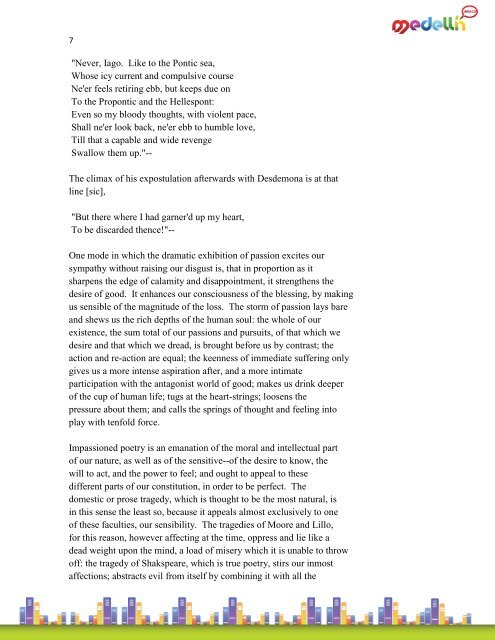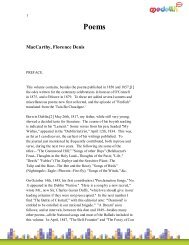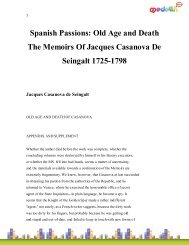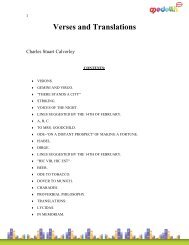Lectures On The English Poets William Hazlitt
Lectures On The English Poets William Hazlitt
Lectures On The English Poets William Hazlitt
You also want an ePaper? Increase the reach of your titles
YUMPU automatically turns print PDFs into web optimized ePapers that Google loves.
7<br />
"Never, Iago. Like to the Pontic sea,<br />
Whose icy current and compulsive course<br />
Ne'er feels retiring ebb, but keeps due on<br />
To the Propontic and the Hellespont:<br />
Even so my bloody thoughts, with violent pace,<br />
Shall ne'er look back, ne'er ebb to humble love,<br />
Till that a capable and wide revenge<br />
Swallow them up."--<br />
<strong>The</strong> climax of his expostulation afterwards with Desdemona is at that<br />
line [sic],<br />
"But there where I had garner'd up my heart,<br />
To be discarded thence!"--<br />
<strong>On</strong>e mode in which the dramatic exhibition of passion excites our<br />
sympathy without raising our disgust is, that in proportion as it<br />
sharpens the edge of calamity and disappointment, it strengthens the<br />
desire of good. It enhances our consciousness of the blessing, by making<br />
us sensible of the magnitude of the loss. <strong>The</strong> storm of passion lays bare<br />
and shews us the rich depths of the human soul: the whole of our<br />
existence, the sum total of our passions and pursuits, of that which we<br />
desire and that which we dread, is brought before us by contrast; the<br />
action and re-action are equal; the keenness of immediate suffering only<br />
gives us a more intense aspiration after, and a more intimate<br />
participation with the antagonist world of good; makes us drink deeper<br />
of the cup of human life; tugs at the heart-strings; loosens the<br />
pressure about them; and calls the springs of thought and feeling into<br />
play with tenfold force.<br />
Impassioned poetry is an emanation of the moral and intellectual part<br />
of our nature, as well as of the sensitive--of the desire to know, the<br />
will to act, and the power to feel; and ought to appeal to these<br />
different parts of our constitution, in order to be perfect. <strong>The</strong><br />
domestic or prose tragedy, which is thought to be the most natural, is<br />
in this sense the least so, because it appeals almost exclusively to one<br />
of these faculties, our sensibility. <strong>The</strong> tragedies of Moore and Lillo,<br />
for this reason, however affecting at the time, oppress and lie like a<br />
dead weight upon the mind, a load of misery which it is unable to throw<br />
off: the tragedy of Shakspeare, which is true poetry, stirs our inmost<br />
affections; abstracts evil from itself by combining it with all the

















